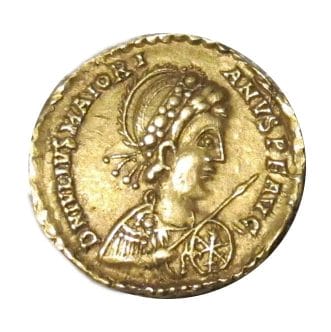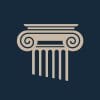Last Updated on November 27, 2023 by Vladimir Vulic
Life: AD ? – 461

- Name: Julius Valerius Majorianus
- Became emperor 1 April AD 457.
- Died on 7 August AD 461 at Dertona.
Little is known of Majorian’s beginnings, although he undoubtedly came from a high-standing family. His maternal grandfather had served Theodosius I as ‘Master of Soldiers’ and his father had been treasurer to Aetius. No doubt aided by such connections, Majorian made a military career and served as an officer to Aetius. But he was eventually dismissed by Aetius due to his wife’s dislike of him.
He retired to his country house but was then recalled to high ranking military command by Valentinian III in AD 455, Aetius having died in AD 454.
After the assassination of Valentinian III in AD 455, Majorian did appear to be a likely candidate to succeed to the western throne, particularly as he enjoyed the support of Marcian, the emperor of the east.
But the throne fell to Petronius Maximus and after his death to Avitus. (There is some suggestions that Majorian might have played a part in the death of Avitus.)
With Avitus gone in AD 456, the empire witnessed of six months during which there was no emperor in the west, with Marcian being the sole emperor of the Roman empire. But this was more a theoretical re-unification of the empire, than an actual one.
But coins were issued in the west, celebrating Marcian as new emperor in the west.
Then in early AD 457 Marcian died. It was either Marcian in his last days or his successor Leo within his first days in power who elevated Majorian to the rank of patrician (patricius), who had by then become ‘Master of Soldiers’ for Gaul and was at the time campaigning against the Marcomanni. Leo, most likely on the advice of the powerful western military figure Ricimer, then nominated Majorian as western emperor.
On 1 April AD 457 he was then duly acclaimed western Augustus, though it is unlikely he actually took up office until late December AD 457.
His first problem as emperor arose in Gaul, where there was considerable resistance against him, after Avitus, whom the people of Gaul had seen as one of their own, had been deposed.
The Burgundians even placed a garrison in the city of Lugdunum (Lyons) against which Majorian needed to lead an army into Gaul and lay siege.
So too did the Visigoths under Theodoric II, a personal friend of Avitus, lead a rebellion against the new emperor. They besieged Arelate (Arles) but were eventually beaten off by Aegidius, the ‘Master of Soldiers’ in Gaul.
His territories under control again, Majorian was left to deal with Geiseric and his Vandals who still controlled at least the western Mediterranean from their hold in north Africa.
Majorian is said to have been a very impressive character. Historians appear to lose any restraint in their praise for Majorian. One hence can conclude that he must have been a outstanding person.
Though some of the tales about him, must rather been seen as myth. One such report for example tells of Majorian having travelled to Carthage (with his hair dyed to disguise him) in order to view the Vandal realm with his own eyes.
He was also a substantial law maker, seeking to curb abuses of power, even reviving the position of ‘Defender of the People’ in the cities.
First a Vandal raiding force was driven out of Campania in Italy, then Majorian began to assemble a massive invasion force with which to invade north Africa and which, in AD 460 he marched the army impressive army to Carthago Nova (Cartagena) in Spain.
But Geiseric received information from his many spies about this undertaking and launched a surprise attack on Majorian’s fleet which was being prepared in the bay of Lucentum (Alicante).
With his fleet smashed, there was no way for Majorian to set his troops across to north Africa, and he was forced to come to terms with Geiseric, recognizing him as king of Mauretania and Tripolitania.
Though Ricimer, still the all-powerful head of the military, saw Majorian’s failure in dealing with Geiseric as a shameful stain on the emperor’s honour. Ricimer sought not to be associated with failure. No longer understanding Majorian as a viable emperor he therefore simply sought to depose him.
On 2 August AD 461 a mutiny broke out in Dertona (Tortona) as the emperor passed trough it on his return journey back to Italy from Spain. Caught up in the mutiny, Majorian was forced by the soldiers to abdicate. It is very likely the mutiny was organized from afar by Ricimer. In any case, five days later it was reported that Majorian had died from illness. Though it clearly appears more likely that he was simply murdered.

Historian Franco Cavazzi dedicated hundreds of hours of his life to creating this website, roman-empire.net as a trove of educational material on this fascinating period of history. His work has been cited in a number of textbooks on the Roman Empire and mentioned on numerous publications such as the New York Times, PBS, The Guardian, and many more.
